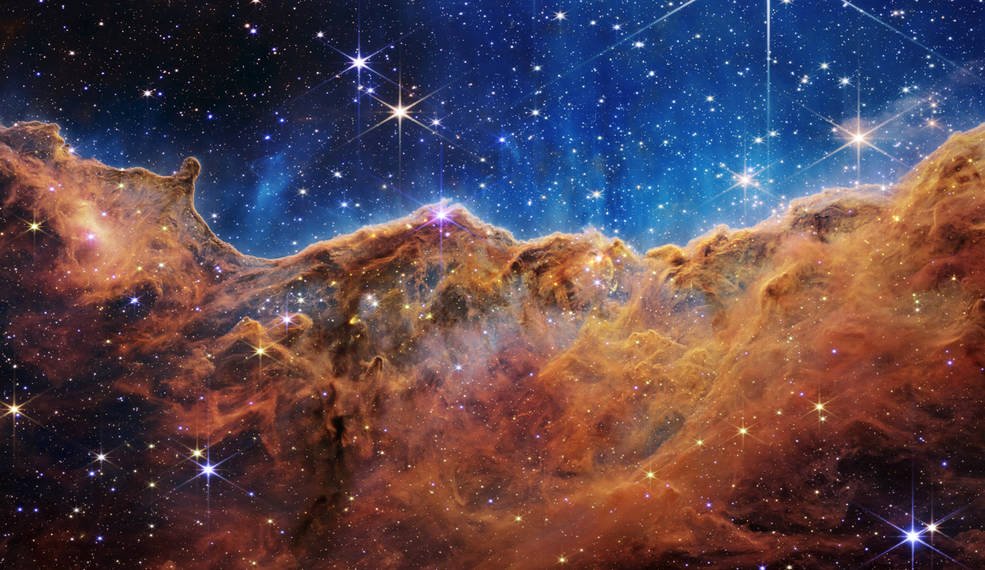An image from the James Webb telescope. True education embraces wonder, Eckhart says.
In October, the Australian Government, for the first time, will deliver a ‘well-being budget’. In so doing, Australia will join other countries including Bhutan, Iceland, Finland and New Zealand in recognising that economics alone is not an adequate measure of a nation’s well-being. German mystic Meister Eckhart (c.1260-1328) would approve. In the last posting on Living Water, the Rev’d John Stewart summarised Eckhart’s teachings*. Here he draws on Matthew Fox’s book Meister Eckhart: A Mystic-Warrior for our Times to distil some of Eckhart’s wisdom in the fields of ecumenism, economics, ecology and education.
Eckhart calls us to go “beyond religion” as structure, dogma, institution, sectarian tribe, and ethnic identity, to something more internal, more deep, more real. He calls us to spirituality, mystical experience, and prophetic action.
He calls us to the Four E’s:
Deep Ecumenism
Eckhart says God is on all paths, and equal in all modes, for the person who can take Him equally. Eckhart’s teachings have been embraced by people of all religious traditions: Christians, Jews, Hindus, Muslims, Sufis, Indigenous people, and so on. He says Divinity is a great underground river that no one can dam up and no one can stop. Fox says This underground river is the shared wisdom that all religions hold in common. One river, many wells. He also says: The wisdom of the world’s spiritual traditions cannot be confined to doctrines and dogmas and institutions and religious garb. There is a far deeper layer to religion that binds us together. That layer is experience of the Divine.
Deep Ecology
What Thomas Berry calls “The Great Work” and what Teilhard de Chardin calls “the mysticism of evolution” stare us all in the face. Earth survival, human sustainability on the planet, requires an Earth-based spirituality. We cannot survive as a species on the path we are on. Eckhart says that God is in all things by essence, by virtue and by power ... all creatures are like the footprint of God. All that is is holy for Eckhart – stars and caterpillars, stones and flowers, you and me.
Eckhart calls us to an awareness of the holy all about us as our Creator is present and active. Then God takes pleasure in all creation; as Genesis insists, creation is good.
Do we have the will and the moral imagination to reinvent the way we live on the earth? To move to a new level of creating sustainable energy on the planet? Eckhart reminds us that we live in a sacred world that requires respect, reverence and responsibility. Can we let go of wars with one another and create a unity of purpose that transcends all nations, ethnicities, religions, economic systems and ideologies?
Deep Economics
When Eckhart was living in Cologne the Cathedral was being built. Cologne was a major centre for trade and goods passing down the Rhine to southern and eastern Europe. He preached a sermon from the pulpit in the cathedral which was at the time half completed. He chose the Gospel of Jesus driving money lenders out of the Temple (Matthew 21.12) to make the point that the only temple that counts is the temple of the human soul. This temple, which God wishes to rule over powerfully according to his own will, is the soul of a person. God has formed and created this soul very like himself, in his own image (Genesis 1.26).
Eckhart criticised the merchants, the bankers, the bishops and the erectors of the new cathedral – those who were buying and selling just like the ones Jesus whipped and drove out of the temple. He stepped on powerful toes displaying the prophetic side of his message, thus imitating Jesus. His belief is that truth doesn’t long for any commercial deal. God does not seek his own interest.
We must create a world that works for everyone. An economics that works for everyone. An economics that puts the poorest of the poor before the enabling of the mighty, as Jesus proposed (Matthew 25.40; 21.13). Eckhart says: Were a person in so great a rapture as St Paul once experienced, and he learned of a sick person who needed a cup of soup from him, I consider it far better that you leave your rapture out of love and serve the needy person with what is a bigger love by far.
An economics where justice matters means an economics that works for the Earth and all creatures – not only humans but water and soil, forests and air and everything that lives. It is also an economics that works for the future and the generations to come.
Deep Education
Eckhart guides us to honour values, not information. With his help, we can put behind us education for silliness, education for militarism, education for an industrial world of the 19th century, education for taking tests, education for boredom, education for anthropocentrism and narrowness, education for the empire.
This begins by embracing wonder at our bigger selves, and our biggest contact, the cosmos, a cosmos awash in creativity and expansion and silence and dark mystery, (as the recent images from the James Webb telescope vividly attest).
Why wouldn’t education mirror the wonders and imagination of the universe itself? How else can we fit into the universe if we are not learning its wonders and its ways? Eckhart can encourage us with this because he, as much as anyone, made clear by the teaching and model of his life how creative we all are and how central creativity is to our humanity. Fox says He can be the model for the type of wisdom schools that could replace the knowledge factories.
*See: https://www.thelivingwater.com.au/blog/go-out-of-yourself-and-let-god-be-god-in-you
The Rev’d John Stewart is Co-Director of the Living Well Centre for Christian Spirituality, in Melbourne, Australia. For more information about the centre see: www.livingwellcentre.org.au
